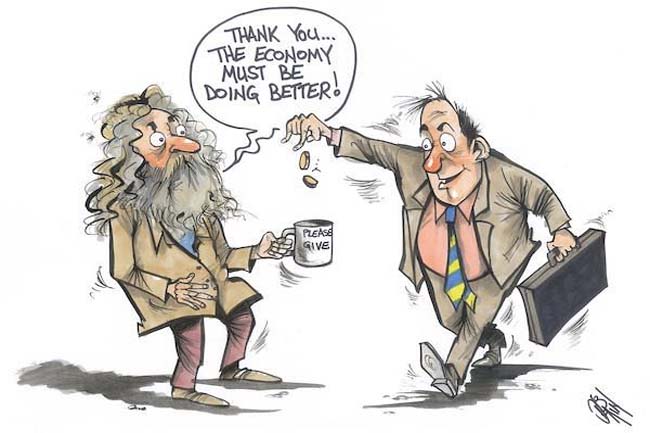Dr Steven Hail writes that, contrary to conventional economic thinking, government surpluses don't benefit the economy.
I LIKE TO wake up in the mornings to ABC News Radio, but every now and then they spoil my day by repeating twice every hour, without a hint of criticism, scepticism or balance, some piece of nonsense about macroeconomics.
Last Monday's nonsense was a claim that Australia’s Commonwealth Government should have a fiscal surplus next year; that this is for some reason a good thing; that both political parties should take care to avoid jeopardising this surplus during our election campaign; and that growing fiscal surpluses can be expected in subsequent years.
It is indeed possible that there will be a fiscal surplus next year, if household savings continue to diminish, with households continuing to support the economy by cutting back on their saving and continuing to take on debt – and if commodity prices stay high – with a low current account deficit. However, that surplus is unnecessary, unwelcome and unjustified, and is also unsustainable, given the state of private sector balance sheets.
To put it another way, the medium term forecasts of orthodox forecasters about the fiscal balance are extremely unlikely to be accurate. This is not because of the inevitable uncertainties of an evolving economy. It is because they get the monetary system wrong.
They more or less completely ignore the mechanics of our monetary system, in fact.
This is the reason why so many orthodox macroeconomists have been so wrong about so many things over the past 30 years.
In the early 1990s, most of them were wrong about the design of the European single currency. Those non-orthodox economists, now called modern monetary theorists, identified what was wrong with the design of the currency at its inception and explained why it would break down in a crisis.
Later in the 1990s, most orthodox economists were wrong about the deregulation of the U.S. and international financial systems and also about the economic consequences of the Clinton fiscal surpluses.
Modern monetary theorists knew the surpluses were unsustainable, because of what they required to be true of non-government balance sheets. Modern monetary theorists knew that the financial deregulation necessary to force private debt to fund a government surplus would drive the financial system towards a Minskian financial crisis.
In the mid-2000s, most orthodox economists believed they had achieved a sustainable "great moderation", where skilled central banks could manage interest rates in such a way as to avoid any major economic downturn. Modern monetary theorists knew and stated many times that private sector balance sheets in countries like the U.S. were evolving in a way which was fundamentally unsustainable and would be followed by a prolonged recession.
After the Global Financial Crisis (GFC) hit, most orthodox economists thought large-scale quantitative easing would be inflationary. Modern monetary theorists knew that quantitative easing would achieve very little or nothing to support the real economy and that only fiscal policy could do that.
Most orthodox economists believed fiscal deficits should be used only as an emergency measure and to a limited degree. Some argued that larger government debt would depress private spending and might hold an economic recovery back.
These economists went so far as to talk of fiscal contraction expansions, where the private sector was supposedly going to respond to austerity by renewed confidence and more private investment.
Modern monetary theorists explained over and over that austerity would be destructive and counter-productive, that larger and prolonged fiscal deficits were the key to the recovery of demand and private investment by businesses starved of customers and cash-flow.
Most orthodox economists thought countries like the U.S. and Australia could become like Greece or Italy, due to deficit spending. This, of course, harks back to their complete misunderstanding of the problems with the Euro as a currency I mentioned above.
And now, in Australia, we have the Governor of the Reserve Bank of Australia (RBA) and others urging politicians to pursue a fiscal surplus and projecting surpluses in years to come.
It is a strange thing to say, perhaps, but modern monetary theorists argue that these people do not understand how monetary systems work.
How is a fiscal surplus to be financed, for example? It involves the government sector withdrawing more dollars from the private sector than it supplies to that sector. A government surplus involves a non-government deficit. If the country is not to run a current account surplus with the rest of the world, this requires the private sector to collectively go further into debt to support the economy.
That is why the forecasts for surpluses, stretching out into the indefinite future, are ill-informed. They imply implausible future changes in private and foreign balance sheets.
What they imply is unsustainable and what is unsustainable won’t be sustained.
A responsible fiscal policy in Australia right now would involve a significantly larger fiscal deficit than the Government has run of late, with the size of that deficit set at the margin by the scale of a federal job guarantee program.
A fiscal surplus is the opposite of responsible. It is a recipe for instability, driven by an extraordinary lack of understanding of how modern monetary systems actually work.
You can follow Dr Steven Hail on Twitter @StevenHailAus, as well as on Facebook at Green Modern Monetary Theory and Practice. His new book, 'Economics for Sustainable Prosperity', is due to be released by Palgrave Macmillan in July.
 This work is licensed under a Creative Commons Attribution-NonCommercial-NoDerivs 3.0 Australia License
This work is licensed under a Creative Commons Attribution-NonCommercial-NoDerivs 3.0 Australia License
Support independent journalism Subscribe to IA.












